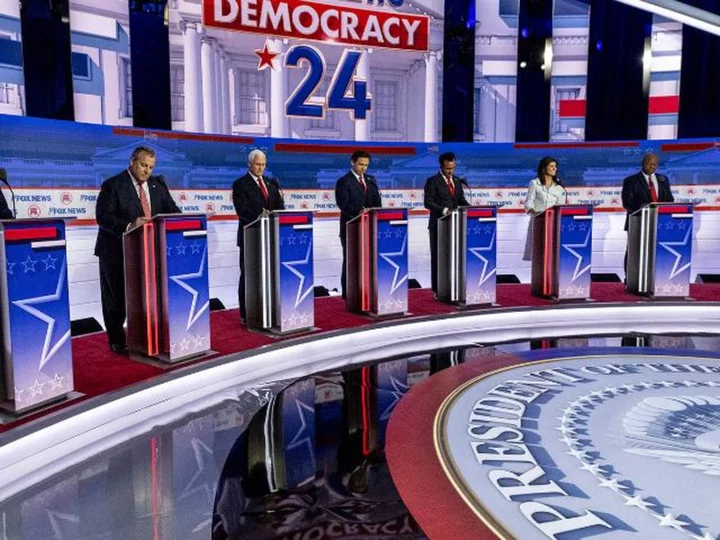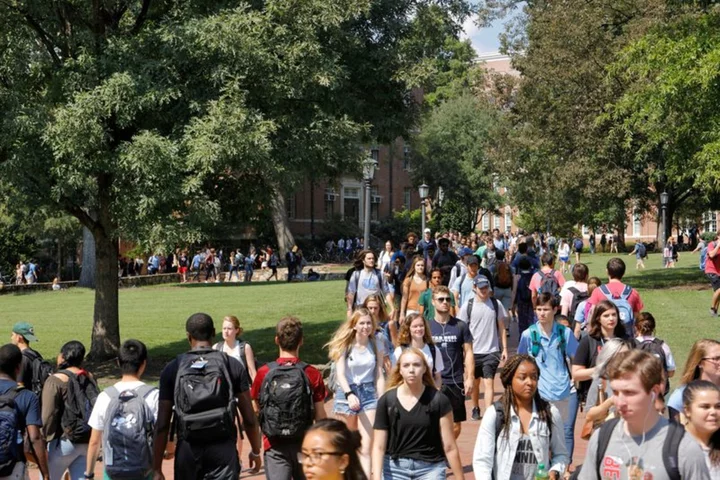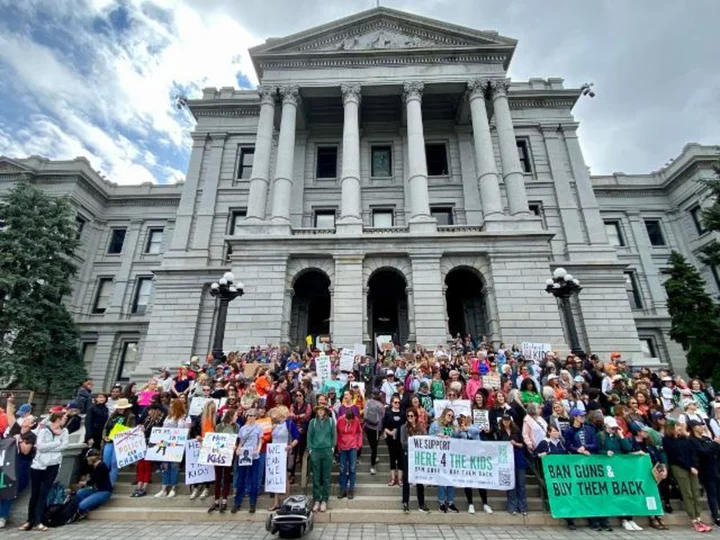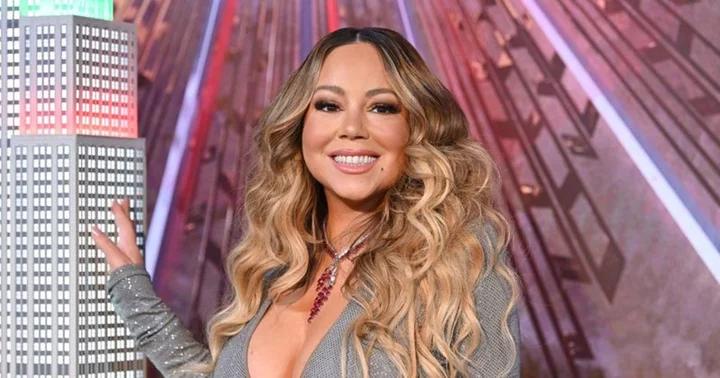The candidates who will gather for the second Republican presidential debate this week face an unusual challenge: how to take on a front-runner who's not on stage and is already acting as if he's the nominee.
Former President Donald Trump's posture was symbolized by his decision to hold a general election-style speech in Michigan rather than attend the debate.
Trump's inclination to look past the primary, even before it's officially begun, partially reflects the historic lead he has amassed in national polls. But it also derives from the failure of the other candidates to formulate a clear line of argument that might threaten him. That failure was on display during the first debate, which he also skipped, when almost all of the field largely ignored him.
"The best thing that Trump has going is that none of his opponents are running a strategy to defeat him," said Mike Murphy, a long-time GOP strategist who has become a frequent Trump critic. "None of his major ones. They are just doing Trump impersonations."
The key question for the second debate may be whether anyone in the field can use Trump's absence to make a stronger case against him -- and force him to reconsider his strategy of virtually ignoring the field. "I can't blame him for skipping the second debate," Murphy said. "If they are not going to engage him, and they are just going to imitate him, then he doesn't have to be there."
At the first debate last month, the candidates devoted very little attention to Trump, whom co-moderator Bret Baier accurately described as "the elephant not in the room." Former Govs. Chris Christie of New Jersey and Asa Hutchinson of Arkansas, as usual, argued that Trump was unfit to serve as president, and former South Carolina Gov. Nikki Haley questioned his capacity to win a general election, calling him "the most disliked politician in America." Haley, who served in his Cabinet as ambassador to the United Nations, also jabbed Trump over the increase in the national debt during his presidency.
But those were little more than momentary exceptions in the 90-minute encounter. Apart from Christie and Hutchinson, all of the candidates indicated they would support Trump if he wins the nomination, despite the 91 felony criminal charges he's facing. The candidates spent much more time sparring with each other than offering any reason for GOP voters to reconsider their support of the man who leads all of them by as much as 40 percentage points in national polls.
Among Republicans skeptical of Trump, the most charitable explanation for the other candidates' behavior was that they wanted to use their first nationally televised forum primarily to introduce themselves to voters. "That's the best argument for why they did what they did: because American voters need to know who they are," said Dave Wilson, a prominent social conservative activist in South Carolina, which holds the third primary on the GOP calendar.
The uncharitable explanation in GOP circles for Trump's relative absence from the debate discussion is that the other candidates are replicating the mistake of his opponents in 2016. In that race, the rest of the primary field also resisted attacking him directly, and instead focused on competing among themselves to become the principal alternative who would theoretically benefit if Trump somehow collapsed on his own.
To many watching the first 2024 debate, this year's crop of Trump competitors appeared engaged in similarly wishful thinking -- or even to be running just to improve their chances of Trump picking them as his vice presidential nominee.
If they are genuinely trying to win the nomination, Trump's rivals have little to show for their deferential posture toward him at that first debate. Trump's lead in national polls remains historically large and, by some indications, has even increased slightly.
Trump's behavior has been just as revealing. Since the debate, he has signaled more overtly that he is already trying to position himself for a presumptive general election rematch with President Joe Biden. "I think there is no other conclusion than that to draw from what we are seeing," says Matt Mackowiak, a Texas-based GOP strategist.
Trump is still campaigning in the early primary states -- albeit less frequently than his opponents -- with appearances in South Carolina this week and Iowa on Sunday, CNN has reported. But he still offered a window into his shifting focus when he decided to skip the debate for a speech with blue-collar workers Wednesday in Michigan, a state that will likely play a more important role in deciding the winner of the general election than of the Republican nomination.
Even more revealing were his comments about abortion during his recent interview on NBC's "Meet the Press." Much of the coverage arguably overstated how much Trump deviated from GOP orthodoxy: read carefully, his answers still clearly signaled he would sign a national abortion ban. The question he left open was not whether, but at what point of pregnancy he would accept a national limit: "What's going to happen is you're going to come up with a number of weeks or months," Trump said.
But Trump did specifically criticize the six-week abortion ban signed by Florida Gov. Ron DeSantis. Such a "heartbeat" ban, notably, has also been signed by the Republican governors in Iowa and South Carolina, which along with New Hampshire, comprise the trio of early voting states that have typically decided the winner in GOP nomination fights.
With those pointed comments, Trump seemed to be making a calculated bet that also underscores his brimming confidence about winning the nomination. Evangelical Christians represent a majority of the GOP voters in both Iowa and South Carolina, but especially in Iowa they have repeatedly delivered victory for the most socially conservative candidates, including Mike Huckabee in 2008, Rick Santorum in 2012 and Ted Cruz in 2016. By denouncing the state's six-week abortion ban, Trump to many appeared to be accepting a higher risk of losing the Iowa caucuses as the price of improving his positioning for a possible general election. "It looks that way to me at the moment," says Mackowiak.
Trump's bonds with his voters are forged more around issues of racial identity and anti-elite populism than traditional social issues, so it remains to be seen how much his comments on abortion may cost him among the social conservatives now in his camp. "Some core conservative pro-lifers are very upset by his comments, but the average voter who is a Donald Trump supporter I don't think it is going to impact them that much," says Wilson. "They are core Donald Trump supporters, period."
But at the least, Trump's comments on abortion seem likely to prompt more attacks on him Wednesday than he faced at the first debate. When they differentiate from Trump at all, most of his rivals -- DeSantis in particular -- seem much more comfortable attacking him from the right as insufficiently conservative. And accusing Trump of slighting the anti-abortion cause offers them a clear opportunity to do so.
The more difficult question for Trump's rivals, especially DeSantis, is whether they would ultimately gain or lose more even in a GOP primary by defining themselves to Trump's right on abortion. For DeSantis, that positioning at this week's debate may be irresistible. The Florida governor is already following the same strategy that allowed Huckabee, Santorum and Cruz to win Iowa. Like them, DeSantis has burrowed deeply into the state, campaigning relentlessly there and focusing on mobilizing support among evangelical Christians by emphasizing his social conservative credentials.
Though Trump still holds a commanding lead in most Iowa surveys, those precedents suggest it's far from inconceivable that DeSantis (or, less likely, someone else) could consolidate support late and squeeze past him in the caucus.
The problem with that strategy, though, is that even after winning Iowa, Huckabee, Santorum and Cruz, of course, did not win the GOP nomination. None of them, as I've written, even won more than a dozen states. They all confronted the same core problem: once defined as the champion of evangelical Christians, they struggled to attract broad support among GOP voters outside that community. That difficulty immediately became apparent in New Hampshire, the next contest after Iowa, where none of those three men attracted as much as 12% of the vote from an electorate with far fewer evangelicals. Trump's team may be betting that even if DeSantis edges past him in Iowa with the Huckabee/Santorum/Cruz strategy, he'll quickly hit the same wall.
"The only way to beat Trump is really simple and really hard: you beat him in Iowa and you beat him in New Hampshire," says Murphy. "That means you can't run the Santorum campaign because it kills you in New Hampshire. You've got to beat him in both."
The potential limitations of DeSantis' Iowa-first strategy could make Haley, who probably generated the most positive momentum out of the first debate, the most important candidate to watch this week. (Entrepreneur Vivek Ramaswamy also attracted substantial attention at the first go-around, but his hectoring performance probably did as much to lower the ceiling on his potential support as to raise the floor.)
Because of Haley's relatively more moderate positioning on abortion, she is unlikely to win the Iowa caucus. (While she personally supports abortion restrictions, she has repeatedly said she does not believe there are the votes in Congress to pass a national ban on the procedure.) But if Haley finished well enough in Iowa to emerge from the caucus with momentum, she may have a more plausible path forward than any of Trump's other rivals in the critical next two states on the calendar.
Because she is not as defined as a culture warrior, Haley is much better positioned than DeSantis (or most of Trump's other rivals) to ride a good Iowa result into a strong showing in New Hampshire, notes Whit Ayres, a veteran Republican pollster. "If Haley came in second in Iowa, or even a strong third, then you go onto New Hampshire and it's a totally different ballgame," Ayres says.
The most recent CNN/University of New Hampshire poll showed Haley joining essentially a four-person pile-up with DeSantis, Ramaswamy and Christie in second behind Trump. And if Haley can do well in New Hampshire, she has a natural base of support in South Carolina, the next state on the calendar. A Fox News poll after the first debate found Haley leapfrogging DeSantis to emerge as the clear second place choice in South Carolina, where she served as governor from 2011 until 2017.
Even if Haley managed to emerge as Trump's principal opponent after the first three states, she would face the challenge of expanding her appeal beyond the moderate and college-educated voters who are providing most of her support in these surveys. (The best evidence suggests that Trump has tilted the GOP electorate even further toward the non-college educated voters who comprise his base.) The larger problem confronting Haley is the same one looming over all the candidates who will reconvene on stage this week: who finishes second doesn't matter that much if Trump remains this far ahead of the field.
Trump's rivals have already ruled out most of the frontal arguments they could make against him. Apart from Christie, Hutchinson and former Texas Rep. Will Hurd, they have rejected the idea that his behavior after the 2020 election disqualifies him from the presidency. By largely echoing Trump's claim that the multiple criminal indictments against him are politically motivated, they have discouraged GOP voters from seeing those as disqualifying either. And the potential argument that Trump can't win a general election has been undercut by Biden's current weakness in surveys, which have produced an array of polls showing the two men in a virtual dead heat.
But other arguments less polarizing for a GOP audience remain available to them, many of Trump's Republican critics note. As Ayres points out, the other candidates could even praise Trump's performance as president but insist the party, and the country, needs a nominee "who looks to the future, not the past, and is not going to be consumed by personal grievance." Haley has come closest to that message, but even she has leaned more heavily on convincing voters that Trump is not electable than that he is no longer the right person for the job.
Mackowiak says the candidates' deference toward Trump at the first debate reflected the GOP's conventional wisdom "that until you are truly one on one with him...all you do by attacking him is hurt yourself and benefit someone else" in the field who stays out of the fight. The problem, he notes, is that while a strategy of minimizing conflict with Trump may be rational for each individual candidate, the collective result is irrational: no one is making a sustained case against a front-runner dominating all of them as the first votes draw nearer. The Republicans chasing the former president will only get so many chances to appeal to a big national audience before Iowa and New Hampshire begin the voting next winter. If they let this debate pass without forcefully challenging Trump, many Republican strategists believe they are certain to regret it.
"As Yogi Berra once said," Mackowiak notes, "'it is starting to get late early out here.'"









